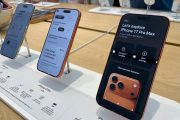“And he causes all, the small and the great, and the rich and the poor, and the free men and the slaves, to be given a mark on their right hand or on their forehead, and he provides that no one will be able to buy or to sell, except the one who has the mark, either the name of the beast or the number of his name.”
— Revelations 13:16-17
So begins an article by writer Mac Slavo about how human-implanted microchips won’t just be popular in the future.
They’ll be mandatory.
Moreover, if his vision of tomorrow is correct, hardly anyone will have to be dragged kicking and screaming by jack-booted storm troopers (or robots?) into that Brave New World; rather, most people will willingly be chipped as we slouch toward Oceania.
In fact, the movement is already in progress. As NewsMax’s James Hirsen recently wrote:
In various places all over the world, there are individuals who open doors, start cars, and control their computers with a mere gesture of their hands or arms.
They are among the first wave of people who have voluntarily allowed a miniature computer chip to be placed inside of their bodies. Most are part of a group that advocates biohacking, a concept in which activists seek to enhance the human body through the use of technology.
Many biohackers also identify with a broader movement known as transhumanism. Transhumanists believe that people will ultimately be able to transform themselves through the use of technology into superior beings that possess expanded capabilities. Adherents of the movement categorize such individuals as “posthuman.”
In inching toward a newly defined humanity, a small radio frequency identification chip (RFID) is being injected into an individual’s hand, wrist, or arm through use of a hypodermic needle in the same manner as a routine vaccine. The implanted microchip broadcasts an identifying number or code, which can be used for a myriad of purposes.
The benefits of this technology are seductive: No more having to carry — and worry about losing — numerous credit cards and other forms of identification. No more fumbling for them when performing transactions; a wave of the hand will suffice. No more showing passports when you travel or your driver’s license to a cop. And since microchipping would facilitate a cashless society, there’d be no more worries about cash loss or theft, and it could put an end to black-market drug and other illegal transactions; identity theft could be eliminated, too (though any technology could conceivably be circumvented). And as Lain Gillespie wrote in the Sydney Morning Herald, “The implants send a unique ID number that can be used to activate devices such as phones and locks, and can link to databases containing limitless information, including personal details such as names, addresses and health records.”
Gillespie also mentioned cybernetics scientist Dr. Mark Gasson of the UK’s University of Reading (UR), who made history recently: After implanting a chip in himself in 2009 to control his office’s electronic gadgets, he became the world’s first human infected with a computer virus. “The virus was replicated on the swipecards of staff accessing his building and infected the university’s database,” writes Gillespie.
Yet Gasson remains enthusiastic about what he characterizes as an inevitable and imminent new technological normal. He says, “It has the potential to change the very essence of what it is to be human.” He believes that microchips’ acceptance will mirror that of mobile phones and that a situation will develop wherein it “will be such a disadvantage not to have the implant that it will essentially not be optional.”
But it gets even stranger. As Gillespie also wrote:
Last year [2013] the line between man and machine became even more blurred, when Stanford University announced its scientists had created the first purely biological transistor that was made entirely of genetic material.
Stanford assistant professor of bioengineering, Dr Drew Endy, described the breakthrough as the final component needed for a biological computer that can operate within living cells and reprogram living systems.
And to some degree the future is now, with biometric technology already being used in certain wide-scale applications. As writer Michael Snyder informs us, a hand-scanning payment method is being tested in southern Sweden, biometric scanners/RFID tracking devices are already used in college dining halls and some amusement parks, and the technology is even “being used in Africa to keep track of who is being vaccinated,” he writes.
But how will this transition from new and novel idea to mandatory mark of the beast? There is precedent for acceptance of such intrusion; after all, your cellphone has an RFID chip and can be used to track your every movement, and its camera can be remotely activated by authorities. And we all have Social Security numbers. But the move toward mandatory status will begin like this, writes Mac Slavo:
First, the technologies will need to be generally accepted by society. It’ll start with real-time consumer based products like Google Glass. The older generations may reject it, but in a couple of years you can bet that tens of millions of kids, teens and younger adults will be roaming the streets while sporting cool shades, interactive web surfing and the capability to record everything around them and upload it to the internet instantly.
Remember that young people especially like the feeling of being “with it,” on the cutting edge, and don’t want to have outdated technology any more than out-of-style clothes; they will leap to be chipped just as they snatch up the latest smart phone. And not only will the technology be convenient, but it will lend an illusion of power. With just a wave of your hand doors will open for you — literally and figuratively.
“Eventually, once the concept is generally accepted by the majority, it will become our new ‘social security number,’” writes Slavo.
You’ll thus need a chip to avail yourself of government services and, sooner or later, to make a purchase (again, society would no doubt become cashless).
At that point circumstances may compel a person to accept an implant even if the government doesn’t. And the implications of this are grave, say many critics. For instance, University of Wollongong professor Katina Michael warns, reports Gillespie:
“RFID microchips are essentially a unique ID embedded in your body, and, as we know, numbers can be stolen and data can be hacked…. They point to an uber-surveillance society that is big brother on the inside looking out. Governments or large corporations would have the ability to track people’s actions and movements … and ultimately even control them.”
Also note that with the government developing the capacity to predict an individual’s behavior with computer algorithms and with science starting to create technology that can decode thoughts and intentions (mind-reading), the future looks, well, quite revelatory.
So will a day come where we dare think only doubleplusgood thoughts? Will 1984 and Brave New World transition from fiction to news? Whatever the case, we can without hesitation now say something about the old Chinese curse, “May you live in interesting times”:
We certainly do.




